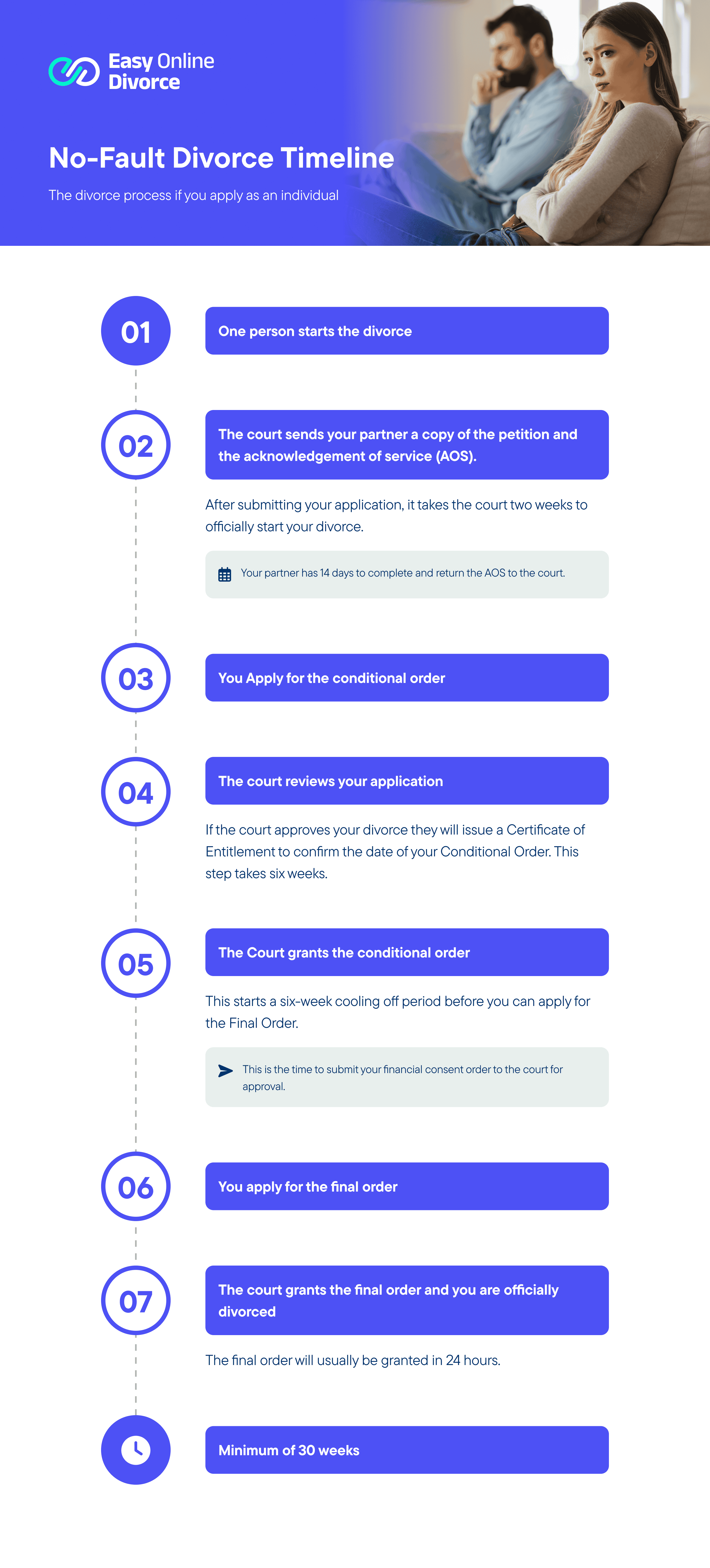Going through a divorce can be a painful, difficult process. When you’ve made the decision to divorce your spouse, you’ll most likely want the process to be over as quickly as possible. If you’re wondering “how long does a divorce take?” there are a number of factors that will influence the duration of the proceedings.
Due to the introduction of no-fault divorce, a divorce in the UK now takes a minimum of 30 weeks from start to finish. However, there are many ways to ensure that the process doesn’t go on longer than necessary, so you can close this chapter and get back to rebuilding your life.
In this guide, we’re going to go over some of the major factors that influence the duration of a divorce proceeding, how you can minimise them, and how to get your divorce finalised as quickly as possible.
How long does a divorce take in the UK?
Since the introduction of no-fault divorce in the UK, a divorce takes no less than 30 weeks to be finalised. Obtaining a Conditional Order (previously referred to as decree nisi) takes a minimum of 20 weeks, and couples must wait a further 6 weeks to obtain a Final Order (previously referred to as a decree absolute) to finalise the divorce.
In between these two waiting periods, you can expect to wait a few weeks for various paperwork to be confirmed and approved. If all paperwork is completed and handed over on time, you can be divorced in under 7 months.
However, the length of your divorce will also be influenced by what type of divorce you opt for. For example, an online divorce can be a much quicker way to finalise the proceedings without going to family court. On average, online divorce is typically four times quicker than a traditional divorce.
However, there are a number of additional factors that can influence the duration of your divorce:
Financial settlement
Having a lot of shared finances or property can prolong the legal process, as you work out how to divide your assets between you and your former spouse. Being able to reach an agreed financial settlement before going to court is one of the easiest ways to reduce the length of your divorce process.
Joint or sole divorce application
In April 2022, divorce laws were modified in England and Wales to allow couples to submit joint applications for divorce. Submitting your divorce application together can speed up and simplify the process; you won’t need to serve any documents to your spouse or wait for them to file their response.
Child arrangements
If you share children together, There isn’t a legal requirement for divorcing couples to have a custody agreement before finalising your divorce. Disputes over parental rights can often prolong the length of your divorce and are often the leading cause of unpleasant divorce battles in court.
Quick resolutions
A fast divorce will largely depend on how cooperative each party is. Unnecessary delays can be caused by disputes over financial agreements or child arrangements, an incomplete divorce application, or a divorce application with incorrect information.
Type of Divorce
The length of your divorce will also depend on what type of divorce you opt for. The quickest option is online divorce, where you can file all your paperwork online and avoid hefty solicitors fees.

Benefits of Online Divorce
The quickest way to get divorced in the UK is via an online divorce. When you use an online divorce service, you’ll save money on legal fees while also avoiding court appearances and lengthy phone calls with the family courts.
Here are just a few reasons why opting for online divorce can be beneficial both to you and your former partner:
Avoid a conflictual divorce
Communicating through divorce solicitors isn’t the most optimal way to organise your post-spousal life, especially if children are involved. When you opt for an online divorce, you’ll be able to communicate amicably with your former partner as you negotiate a divorce settlement.
Conflictual separation proceedings can drag on even for years at a time, as every amendment will have to pass through each party’s lawyers. By opting for an online divorce, you and your former spouse can tackle the important questions together while simultaneously reducing the length of the divorce process.
Save on costs
When you hire solicitors for your divorce, you can expect to pay thousands in legal fees. Divorce online is handled 100% digitally, so you won’t be paying a solicitor £400 an hour to talk through your divorce settlement.
No court appearances
When you opt for an online divorce, the divorce company will handle all communication with the courts on your behalf. This means you won’t need to make any dreaded court appearances with your former partner.
Support and guidance
Online divorce companies will typically offer support services to those using their services. Each party will be offered guidance, support and advice as they go through the motions of their divorce proceedings.
Understanding the divorce process: what to expect
If you’re planning on submitting a divorce petition, there are a number of mandatory steps to take before your proceedings can be finalised.
Here’s what to expect when you file for divorce:
Step 1. D8 Divorce Form
Your first step when filing for divorce will be to fill out a D8 Divorce Form. Your divorce form is your official request – or divorce petition – to begin legal proceedings.
The most important thing to remember when filling out your divorce form is to ensure that all details given are correct and up-to-date. False or missing information on your divorce form will put your application at the back of the queue. You can submit your divorce application online or via your divorce solicitor.
Step 2. Acknowledgement of services
If a spouse is a sole applicant for a divorce, they’ll need to wait for their former partner to file an acknowledgement of services, indicating that they’ve received their divorce papers.
To fill out an acknowledgement of services form, a respondent will be required to respond to a number of questions, asking them to confirm that they’ve received the divorce petition, as well as a number of questions about their identity, residence and whether or not they plan to defend the petition.
As of April 2022, respondents will have 14 days to return an acknowledgement of services.
The reflection period
Once the paperwork has been filed, couples must wait a minimum of 20 weeks before any more proceedings can begin. This is known as the reflection period and allows couples to ensure that they wish to proceed with their divorce.
During this time, couples can also arrange their divorce settlements amicably. Questions of childcare, a financial settlement, and the division of assets can all be settled during this period either independently, via family lawyers, or by using a divorce mediator.
Step 3. Apply for the conditional order
After 20 weeks, couples can apply for a conditional order. This is obtained by filling out a D84 form, and how you fill out this form will depend on whether or not your former partner (the respondent) contests the divorce or not.
Before the changes made to the law in April 2022, you’d most likely need to cite a reason for your conditional order. Now, all UK divorces are categorised as “no-fault” divorces, so a specific justification is no longer necessary. Now, all you need to do is claim that the marriage has broken down.
Step 4: Certificate of entitlement
A certificate of entitlement is a document that confirms whether or not you are entitled to your divorce. If your conditional order has been filled out correctly, you will receive a certificate of entitlement, which will confirm your conditional order and indicate the date you will receive it.
The court grants the conditional order
Once the court grants the conditional order, you and your former partner will technically still be married under the law. In order to finalise your divorce, you’ll need to apply for a final order. You can apply for a final order 6 weeks and 1 day following the approval of your conditional order.
Step 5: Apply for a financial order
A financial order (known as a consent order) is a document used to finalise a financial agreement between you and your former spouse. A consent order will render any financial agreements legally binding, so it’s a good idea to file a financial order as soon as your conditional order is approved.
Parties can apply for a financial order by submitting a consent order for court approval. The application you’ve used is when parties are not in agreement and want to go to court for a judge to decide – this is very expensive costing tens of thousands of pounds – the best option is through our service a consent order – the simplest type a clean break only costing £399. This will then be sent to the family court and will be subject to approval by the judge, who will assess each party’s circumstances and financial responsibilities (such as children). For a consent order to be approved, both parties will need to disclose all their financial information to the court.
Step 6: Apply for the final order
In order to complete your divorce, you’ll need to apply for a final order. Previously referred to as a decree absolute, this finalises the divorce and renders the couple officially divorced in the eyes of the law.
You have to wait a minimum of 6 weeks and 1 day before you can apply for a final order, and it can take a few weeks to be approved.
Court grants the final order
Once the court approves your final order, you and your partner will be recognised as officially divorced.
The Cost of an Average Divorce in the UK

On average, a typical divorce in the UK costs between £2,500 and £14,500. These costs include:
- Application fee costs
- Lawyers fees
- Specialist legal advice
These costs can be largely mitigated by opting for an online divorce, rather than hiring solicitors to handle your divorce proceedings.
Divorce online is also the ideal option if you are on a low income: most couples no longer qualify for legal aid, which is typically only available to those who experienced domestic abuse within their marriage.
Key Takeaways
- While divorce isn’t an overnight process, there are ways that you can minimise unnecessary delays.
- By opting for an online divorce instead of hiring family law solicitors, you’ll be able to speed through the process quickly without any court appearances and without the high costs.
- The speed of your divorce will also depend on how quickly both parties respond to paperwork; couples who cooperate and communicate with each other will divorce faster regardless of filing a sole application or joint than couples in conflict who refuse to cooperate or communicate with each other.

